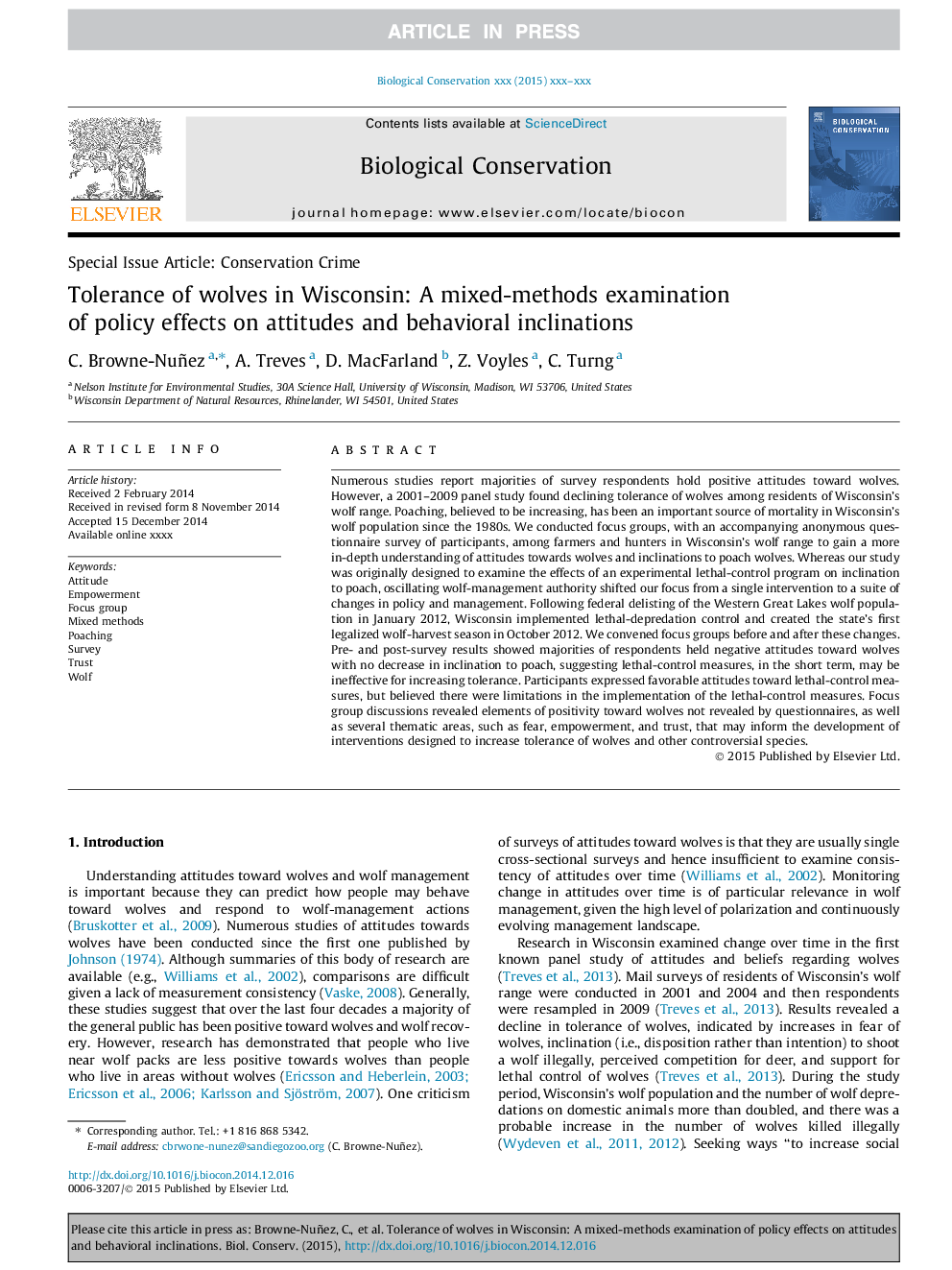| کد مقاله | کد نشریه | سال انتشار | مقاله انگلیسی | نسخه تمام متن |
|---|---|---|---|---|
| 6299164 | 1617912 | 2015 | 13 صفحه PDF | دانلود رایگان |
عنوان انگلیسی مقاله ISI
Tolerance of wolves in Wisconsin: A mixed-methods examination of policy effects on attitudes and behavioral inclinations
ترجمه فارسی عنوان
تحمل گرگ ها در ویسکانسین: روش های متداول بررسی تاثیرات سیاست بر نگرش ها و گرایش های رفتاری
دانلود مقاله + سفارش ترجمه
دانلود مقاله ISI انگلیسی
رایگان برای ایرانیان
کلمات کلیدی
نگرش، توانمندسازی، گروه تمرکز، روش های متفرقه، شکارچی نظر سنجی، اعتماد، گرگ،
ترجمه چکیده
مطالعات متعدد گزارش می دهند که اکثریت از پاسخ دهندگان بررسی نگرش مثبت نسبت به گرگ دارند. با این حال، یک مطالعه پانل 2001-2009 نشان داد که تحمل گرگ در میان ساکنان گرگ ویسکانسین کاهش یافته است. شعله ور شدن، به نظر می رسد افزایش می یابد، از دهه 1980، یک منبع مهم مرگ و میر در جمعیت گرگ ویسکانسین بوده است. ما گروه های تمرکز را با بررسی متقاضی ناشناس در میان شرکت کنندگان، در میان کشاورزان و شکارچیان در گرگ ویسکانسین انجام دادیم تا درک عمیق تر از نگرش نسبت به گرگ ها و گرایشات گرگ ها را داشته باشیم. در حالیکه مطالعه ما در ابتدا برای بررسی اثرات یک برنامه کنترل کشنده آزمایشگاهی بر تمایل به گوشتخوار طراحی شده بود، نوسانگر قدرت مدیریت گرگ تمرکز ما را از یک مداخله واحد به مجموعه ای از تغییرات در سیاست و مدیریت نقل مکان کرد. در ماه ژانویه 2012 پس از حذف فلیکران جمعیت گرگ دریاچه های غرب غربی، ویسکانسین کنترل اذیت و آزار و اذیت را اجرا کرد و اول ماه اکتوبر نخستین دوره قانونی سازی گرگ را در سال 2012 ایجاد کرد. ما گروه های تمرکز را قبل و بعد از این تغییرات تشکیل دادیم. نتایج پیش و پس از بررسی نشان داد که اکثر پاسخ دهندگان نگرش منفی نسبت به گرگ ها را بدون هیچ گونه کاهش میل به قارچ نداشتند، پیشنهاد می کند که در کوتاه مدت، اقدامات کنترل کشنده، برای افزایش تحمل بی تاثیر باشد. شرکت کنندگان نگرش مطلوب به اقدامات کنترل کشنده را بیان کردند، اما معتقد بودند محدودیت در اجرای اقدامات کنترل کشنده وجود دارد. بحث های گروهی فاکتور، عناصری از مثبت بودن نسبت به گرگ ها با استفاده از پرسشنامه ها، و همچنین چندین حوزه موضوعی مانند ترس، توانمندسازی و اعتماد نداشتند، که ممکن است به توسعه اقدامات طراحی شده برای افزایش تحمل گرگ و سایر گونه های بحث انگیز اطلاع دهد.
موضوعات مرتبط
علوم زیستی و بیوفناوری
علوم کشاورزی و بیولوژیک
بوم شناسی، تکامل، رفتار و سامانه شناسی
چکیده انگلیسی
Numerous studies report majorities of survey respondents hold positive attitudes toward wolves. However, a 2001-2009 panel study found declining tolerance of wolves among residents of Wisconsin's wolf range. Poaching, believed to be increasing, has been an important source of mortality in Wisconsin's wolf population since the 1980s. We conducted focus groups, with an accompanying anonymous questionnaire survey of participants, among farmers and hunters in Wisconsin's wolf range to gain a more in-depth understanding of attitudes towards wolves and inclinations to poach wolves. Whereas our study was originally designed to examine the effects of an experimental lethal-control program on inclination to poach, oscillating wolf-management authority shifted our focus from a single intervention to a suite of changes in policy and management. Following federal delisting of the Western Great Lakes wolf population in January 2012, Wisconsin implemented lethal-depredation control and created the state's first legalized wolf-harvest season in October 2012. We convened focus groups before and after these changes. Pre- and post-survey results showed majorities of respondents held negative attitudes toward wolves with no decrease in inclination to poach, suggesting lethal-control measures, in the short term, may be ineffective for increasing tolerance. Participants expressed favorable attitudes toward lethal-control measures, but believed there were limitations in the implementation of the lethal-control measures. Focus group discussions revealed elements of positivity toward wolves not revealed by questionnaires, as well as several thematic areas, such as fear, empowerment, and trust, that may inform the development of interventions designed to increase tolerance of wolves and other controversial species.
ناشر
Database: Elsevier - ScienceDirect (ساینس دایرکت)
Journal: Biological Conservation - Volume 189, September 2015, Pages 59-71
Journal: Biological Conservation - Volume 189, September 2015, Pages 59-71
نویسندگان
C. Browne-Nuñez, A. Treves, D. MacFarland, Z. Voyles, C. Turng,
